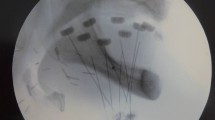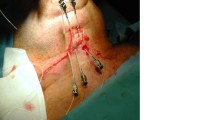Purpose:
The efficacy of curative low-dose-rate (LDR) brachytherapy for recurrent and/or residual cancer following radical operation or irradiation and posttreatment quality of life (QoL) were assessed.
Patients and Methods:
Between January 1979 and April 2004, 88 patients who had received curative LDR brachytherapy (28 with postoperative close or positive margins, six with postoperative recurrence, six with recurrence after external-beam irradiation, and 48 with recurrent/residual cancer after curative brachytherapy) were analyzed retrospectively. Late complications were assessed based on the RTOG/EORTC late radiation morbidity score scheme.
Results:
The 5-year relapse-free and cause-specific survival rates were 92% and 96%, respectively, in the close/positive margin group and 52% and 56%, respectively, in the postbrachytherapy recurrence or residual cancer group. The incidence of late side effects was 8% (2/26) in the close or positive margin group and 22% (4/18) in the postbrachytherapy group. The only grade 4 late complication (bone exposure) was observed in one patient in the postbrachytherapy group.
Conclusion:
LDR brachytherapy as reirradiation for recurrent/residual tongue cancer was effective, and there was no increase in complications.
Ziel:
Die Wirksamkeit einer kurativen Brachytherapie mit niedriger Dosisleistung (LDR) bei Rezidiv und/oder Resttumor nach radikaler Operation oder Bestrahlung wurde bezüglich der Lebensqualität nach Behandlung untersucht.
Patienten und Methodik:
88 Patienten, die zwischen Januar 1979 und April 2004 eine LDR-Brachytherapie erhalten hatten, wurden retrospektiv analysiert (28 mit knappen oder positiven Schnitträndern, sechs mit postoperativem Rezidiv, sechs mit Rezidiv nach Teletherapie sowie 48 mit Rezidiv bzw. Resttumor nach Brachytherapie). Späte Komplikationen wurden auf der Grundlage des „late radiation morbidity score scheme“ der RTOG/EORTC klassifiziert.
Ergebnisse:
Die rezidivfreie und die tumorspezifische 5-Jahres-Überlebensrate betrugen in der Gruppe mit knappen oder positiven Schnitträndern 92% und 96% sowie in der Gruppe mit Rezidiv oder Resttumor nach Brachytherapie 52% und 56%. Die Rate später Nebenwirkungen lag in der Gruppe mit Heilung/positivem Resultat bei 8% (2/26) und in der Gruppe nach Brachytherapie bei 22% (4/18). Die einzige Spätfolge des Grades 4 (Knochenfreilegung) war bei einem Patienten in der Gruppe nach Brachytherapie zu verzeichnen.
Schlussfolgerung:
Die LDR-Brachytherapie als erneute Bestrahlung erwies sich bei Rezidiv oder Resttumor eines Zungenkarzinoms als wirksam. Es kam zu keinem Anstieg der Komplikationen.
Similar content being viewed by others
Author information
Authors and Affiliations
Corresponding author
Rights and permissions
About this article
Cite this article
Ayukawa, F., Shibuya, H., Yoshimura, Ri. et al. Curative Brachytherapy for Recurrent/Residual Tongue Cancer. Strahlenther Onkol 183, 133–137 (2007). https://doi.org/10.1007/s00066-007-1613-5
Received:
Revised:
Issue Date:
DOI: https://doi.org/10.1007/s00066-007-1613-5




